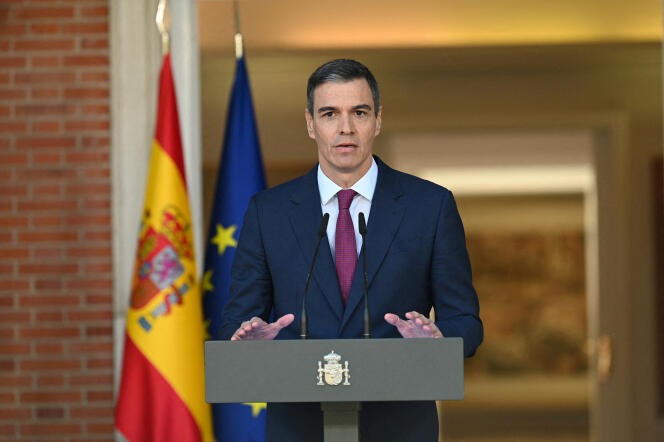


It seemed hard to imagine Pedro Sanchez simply reversing course after having threatened, on April 24, to resign. A master of theatrical coups, however, the Socialist head of the Spanish government did just that, on Monday, April 29, with a pithy statement: "I have decided to stay, with even greater strength, if that is possible." After five days of silence and suspension of all public activity, during which Spain held its breath, he tried to turn this disconcerting ellipsis to his advantage by pledging "to work tirelessly for the regeneration of [Spanish] democracy," which in his view has been damaged by insults and false accusations.
"Either we say stop, or the degradation of public life will determine our future and condemn our country," said Sanchez, in a solemn address at the Moncloa Palace, the seat of government. The Socialist leader placed the tense political climate in the context of a "global reactionary movement that aspires to impose its regressive agenda through defamation and lies, hatred and fears."
On Wednesday, April 24, in an open letter to his fellow citizens, the leader announced his need to "reflect" on "whether it is worthwhile" to remain in power, in view of the "attacks" made against his wife, Begoña Gomez, by a "coalition of right-wing and ultra-right-wing interests" and disseminated by "ultra-conservative media." That morning, a preliminary investigation had been opened against her for alleged influence peddling, following a complaint from a far-right association based on press articles – a basis which, according to Supreme Court doctrine, should have invalidated it. On Friday, the public prosecutor's office asked that the complaint be dropped.
If Pedro Sanchez's threat to resign was intended to close the ranks of his majority around him and remobilize the Socialist electorate by portraying himself as a victim of a nauseating political climate, it seems his gamble has succeeded. On Saturday, thousands of activists gathered in front of the headquarters of the Partido Socialista Obrero Español (PSOE - the Spanish Socialist Workers' Party), shouting "Quedate!" ("Stay!") In a manifesto for "concord and democratic coexistence," more than 2,500 Socialist elected representatives warned against the political instrumentalization of justice. Meanwhile, hundreds of journalists signed a statement against the "putschism" of the "judicial and media ultra-right."
In the opinion of the president of the Partido Popular (PP, right-wing), Alberto Nuñez Feijoo, the chief executive used "tactics" and showed "narcissism" and "populism." "He doesn't want judges, opposition or independent media," he said.
You have 50.2% of this article left to read. The rest is for subscribers only.
